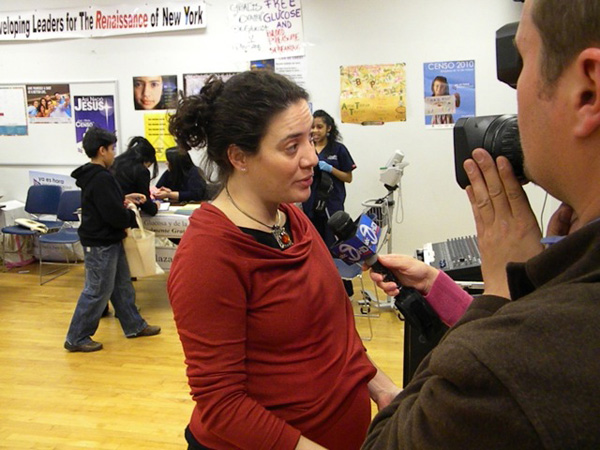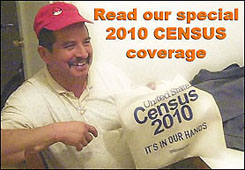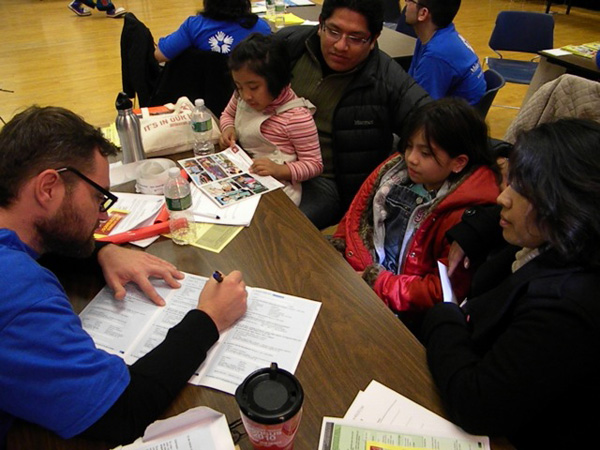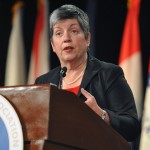
NYC Immigrant Affairs Commissioner Fatima Shama speaks with reporters at a census fair in Jackson Heights, Queens. (Photo: John Rudolph)
The number of New Yorkers who have mailed back their completed census forms “is horribly low right now,” the city’s Commissioner of Immigrant Affairs Fatima Shama said this weekend.
“We know what the number is,” Shama said. “Let’s try to get everyone to participate right now.”
 With the April 1 national census deadline still a few days away, the statement from a member of Mayor Michael Bloomberg’s administration highlighted the challenge facing the city as it attempts to reverse a decades-long trend of having the lowest census mail-in response rate of any major city in the nation.
With the April 1 national census deadline still a few days away, the statement from a member of Mayor Michael Bloomberg’s administration highlighted the challenge facing the city as it attempts to reverse a decades-long trend of having the lowest census mail-in response rate of any major city in the nation.
Shama made the comment on Saturday at an event in Queens where volunteers speaking Spanish, Hindi, Chinese and four other languages were on hand to help Hispanic and Asian immigrants fill out their census forms. Immigrants have been the focus of an intensive campaign by the government and private groups in New York to raise participation levels in what are known as hard-to-count communities.
According to an interactive map on the U.S. Census Bureau’s web site, as of Sunday the national participation rate in the census stood at 34 percent, but only 21 percent of New York’s population had mailed back their completed census forms.
The stakes are high for New York, as they are in communities across the nation. New York City receives about $3,000 a year in federal aid for each person counted by the census. Pointing to a nine-year-old boy at the Queens event, City Council Member Julissa Ferreras, estimated that if he’s not counted, the city will lose $30,000 in the decade until the next census is conducted.
“That’s ten years of resources needed to cover his time in public school, before he goes to college,” Ferreras said.
Despite a massive advertising and public relations campaign and efforts by community groups to make personal contact with immigrants where they live and work, Ferreras asserted that many people still don’t understand the census form or their legal responsibility to participate in the census.

A volunteer helps a Mexican-American family fill out their census form at an event in Queens, NY to encourage immigrant participation in the 2010 Census. (Photo: John Rudolph)
Among undocumented immigrants there is widespread apprehension that giving personal information to the government will lead to their deportation. Government officials and private groups have been working hard to address this fear by repeating the mantra that information provided on the census form is confidential and won’t be shared with other government agencies.
But the fear will increase as the tactics used to count immigrants change in the coming months, according to Shama. In May, census workers will fan out across the country, going door to door to count people who have not mailed in their forms. Shama predicts that effort will set off alarms when undocumented immigrants see government employees coming to their homes looking for personal information.
“If people have to go out knocking on doors, the fear in the community is going to increase,” she said.
Shama said the best way to avoid this problem is to get people to mail in their forms. “Let’s try to get everyone to participate right now,” she insisted.
The Feet in Two Worlds project on the Census is made possible thanks to the generous support of the 2010 Census Outreach Initiative Fund at The New York Community Trust and the Laurie M. Tisch Illumination Fund.




